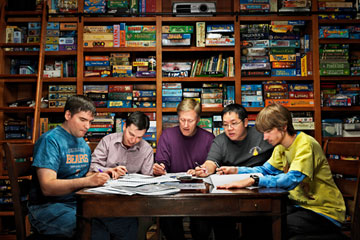
(2 of 7)
Because puzzles are actually neither work nor play; they're something else. "We're faced with problems every day in life, and we almost never get clarity," says Will Shortz, the crossword editor of both the New York Times and NPR. "We jump into the middle of a problem, we carry it through to whatever extent we can to find an answer, then we just get on with things and find the next thing. Whereas with a human-made puzzle, you have the satisfaction of being completely in control: you start the challenge from the beginning, and you move all the way to the end. That's a satisfaction you don't get much in real life. You feel in control, and that's a great feeling.
"And as with any human activity," Shortz goes on to say, "you want to know how good you are compared with other people." Hence the WPC.
For many years, the major international competition on the puzzling calendar was the International Crossword Marathon, a tradition that began in Poland in 1984. (If you're noticing an East European theme to this article, it's because that part of the world has a highly robust puzzling culture, dating back to the economically straitened, media-poor period in the 1970s and '80s, when a lot of Eastern Europeans had only pencils and paper for entertainment.) The object of the International Crossword Marathon was to create the largest possible crossword puzzle--25 squares wide and as long as you could make it--in 24 hours.
Shortz went every year, but privately he thought it was a little silly. Participants used their own languages and their own national crossword rules, and as a result it wasn't a very good basis for comparing raw puzzle-solving skill across cultures. Plus it was exhausting. Shortz imagined something that would be closer to an Olympics of logic. "My idea," he says, "was that we would have a true competition that would be equal for all countries. It would not involve word puzzles like crosswords. It would involve things like--nowadays--sudoku, KenKen, number puzzles, logic puzzles, picture puzzles. Things that everyone can do equally, no matter what their language and culture." The first WPC was held in New York City in 1992. It's been held in a different city every year since: Minsk, Rio de Janeiro, Cologne, Utrecht. And Kraljevica.
Unbeknownst to many of its inhabitants, the U.S. is a powerful puzzling nation, having won world championships in 15 of the past 21 years, either as a team or as individuals. We sent two four-person teams to Kraljevica, an A team and a B team, drawn from the top finishers at the U.S. Puzzle Championship, an open event that takes place every summer. This year the American teams were composed entirely of men; in terms of the gender imbalance, the U.S. puzzle establishment is shamefully retrograde. (Women are better represented on the teams from Europe.)
High-level competitive puzzlers tend to be single (at this level, puzzles have a way of eating your life and leaving no room for anything else), tend to have a math or computer-science background and tend to be young. The elder statesman of Team USA, at 37, is Wei-Hwa Huang, a former Google coder who quit to design and solve puzzles full time. Calm and apparently infinitely knowledgeable, Huang has been at every WPC except the first. He's won it four times, though the last time was in 1999.
